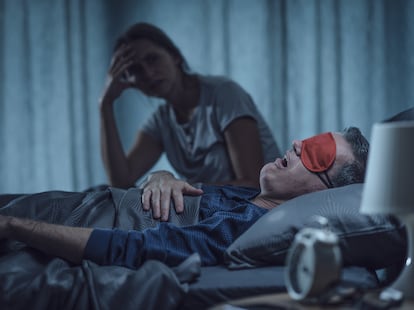When snoring is as loud as an ambulance siren: Expert tips for controlling it
Four professionals explain whether sprays, nasal strips and oral or postural devices help

“Some snoring sounds reach 80 decibels, the same volume as an ambulance siren,” says Carlos Egea. The pulmonologist and president of the Spanish Federation of Sleep Medicine Societies emphasizes that it’s very common for people to consult a specialist for snoring: “Love has its limits, and when noise prevents sleep, the partner usually takes the initiative.” Social media is full of supposed solutions for snoring, ranging from nasal strips and sprays to mouth stickers and postural devices. EL PAÍS analyzed, with the help of experts, which tricks really help reduce snoring and improve sleep quality.
Before examining possible solutions, it’s essential to understand the causes of snoring. Its origin, according to Egea, is linked to evolution. “In the transition from primates to humans, we demanded from nature a larger skull, but with a smaller face,” he says. This, according to the expert, has caused the two maxillary bones to shift backward. However, “the space for the tongue and other oral structures has stayed the same, which has reduced the available space.”
Added to this is the fact that when you sleep, the throat muscles relax, narrowing the airways. Carlos O’Connor Reina, president of the Snoring and Sleep Disorders Committee of the Spanish Society of Otorhinolaryngology and Head and Neck Surgery (SEORL-CCC), explains that when air passes through this narrow space, the tissues vibrate, producing the sound of snoring. There can be multiple causes for snoring: “Nasal congestion, obesity, alcohol consumption, smoking, sleep apnea, or unfavorable anatomy, such as enlarged tonsils or a soft palate.”
“The important thing is not to try to solve the snoring itself, but to investigate its cause, since behind it there may be a serious health problem such as obstructive sleep apnea (OSA) or some other sleep disorder,” says Lucía Gorreto, a doctor specializing in family and community medicine and a member of the working group on respiratory diseases and approaches to smoking at the Spanish Society of Family and Community Medicine (semFYC). The experts consulted advise seeking medical attention if snoring is very loud and frequent, especially if accompanied by pauses in breathing, daytime fatigue, morning headaches, mood swings, or difficulty concentrating.
To mitigate snoring, experts suggest several measures, such as losing weight to reduce excess tissue in the throat and avoiding alcohol and sedatives, as they can cause excessive relaxation of the muscles in this area. However, they insist there are no magic wands. Here are some of the tricks and what the scientific evidence says about their effectiveness:
Nasal strips
Nasal strips are adhesive pads placed over the bridge of the nose and contain flexible bands that help open the nostrils, facilitating air entry. According to Gorreto, “they can be effective in people with nasal snoring due to alterations in nasal morphology.” However, in other cases, there is no evidence that they improve snoring. O’Connor agrees that they can be useful in cases of mild nasal snoring and recommends them when there is nasal congestion or narrowness without a serious structural cause. However, she warns: “They are not useful if the snoring is of oral origin or due to sleep apnea.”
Anti-snoring sprays
There are sprays that claim to lubricate and tone throat tissues to reduce the vibrations that cause snoring. O’Connor assures that their effectiveness is very limited and usually temporary. “They’re not dangerous, but they don’t address the cause of snoring,” notes the expert, who insists that they are not considered an effective medical solution.
Brian Moncada, a general physician and sleep specialist at the Sleep Institute, agrees, warning that there isn’t enough scientific evidence to support their effectiveness. Gorreto also emphasizes that these products may contain essential oils, moisturizers, and anti-inflammatory agents, so they should be used with caution and preferably under medical supervision.
Mouth tape
“The use of adhesive tape to keep the mouth closed during sleep, known as ‘mouth taping,’ has gained popularity on social media,” says Moncada. According to the expert, there is no solid scientific evidence to support its effectiveness, and in some cases it could be harmful. For O’Connor, these stickers can be useful for people who breathe through their mouths without nasal obstruction, as they encourage nasal breathing.
However, he adds that they should not be used if there is difficulty breathing through the nose. The American Sleep Foundation warns that using these tapes can cause difficulty breathing through the nose, lip irritation, pain upon removal, sleep disruptions, and anxiety in those who feel uncomfortable having their mouth covered. Experts advise consulting a health professional before trying this method.
A tennis ball on the back
A classic trick is to place a tennis ball on your back to make sleeping on your back uncomfortable and encourage sleeping on your side. “It’s effective in some cases, since sleeping on your back causes the tongue and soft palate to obstruct the airway,” says O’Connor. For Egea, however, this method is “now a thing of the past.”
He explains that many people with sleep apnea or postural snoring have used a pocket sewn into their pajamas or nightgowns for years to hold a tennis ball. “Until we realized people were falling asleep on the ball, a rock, or whatever,” he says. Precisely for this reason, “postural devices emerged.”
Postural devices
When sleeping, we move between four and five times an hour, according to Egea. Several devices aim to promote lateral positioning during rest. Moncada mentions positional vests, which have inflatable chambers; wedge pillows, which keep the head and torso elevated to reduce snoring by keeping the airway open; positional alarms, which emit vibrating alerts when the person turns onto their back; and side-sleeping backpacks, designed to maintain a lateral position throughout the night. “These techniques are also known as ‘positional therapy’ and can be effective for some people, although their effectiveness varies,” says the expert.
Oral devices
Oral appliances — mandibular advancement splints — advance the jaw to keep the airway open. O’Connor explains: “They are effective in many cases, especially if snoring is caused by a poor tongue position or mild to moderate sleep apnea.” He explains that they should be prescribed by dentists with expertise in sleep medicine and fitted individually.
Gorreto adds that mandibular advancement devices are especially indicated for people with facial dysmorphia or those who cannot use or tolerate CPAP (continuous positive airway pressure), a device that keeps the airways open with a constant flow of air while sleeping.
Tips for the companion
Egea defines snoring as the “listener’s disease,” as it affects the person sharing the room. Some helpful measures recommended by the experts for couples include the use of earplugs, white noise devices, and, in extreme cases, sleeping at different times or in separate rooms.
O’Connor advises avoiding constantly waking the snorer, as this doesn’t solve the problem and can create tension. “These strategies can improve the quality of sleep, although they aren’t definitive solutions,” Gorreto concludes.
Sign up for our weekly newsletter to get more English-language news coverage from EL PAÍS USA Edition
Tu suscripción se está usando en otro dispositivo
¿Quieres añadir otro usuario a tu suscripción?
Si continúas leyendo en este dispositivo, no se podrá leer en el otro.
FlechaTu suscripción se está usando en otro dispositivo y solo puedes acceder a EL PAÍS desde un dispositivo a la vez.
Si quieres compartir tu cuenta, cambia tu suscripción a la modalidad Premium, así podrás añadir otro usuario. Cada uno accederá con su propia cuenta de email, lo que os permitirá personalizar vuestra experiencia en EL PAÍS.
¿Tienes una suscripción de empresa? Accede aquí para contratar más cuentas.
En el caso de no saber quién está usando tu cuenta, te recomendamos cambiar tu contraseña aquí.
Si decides continuar compartiendo tu cuenta, este mensaje se mostrará en tu dispositivo y en el de la otra persona que está usando tu cuenta de forma indefinida, afectando a tu experiencia de lectura. Puedes consultar aquí los términos y condiciones de la suscripción digital.









































